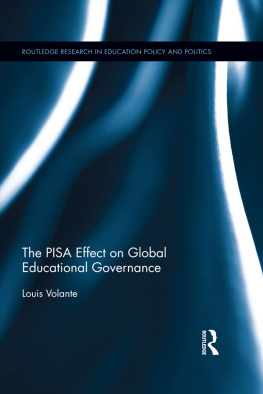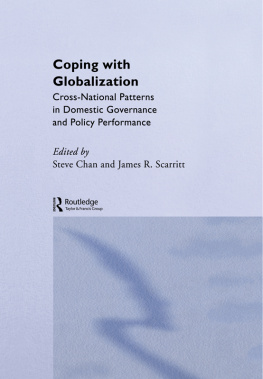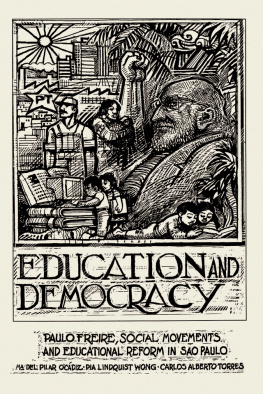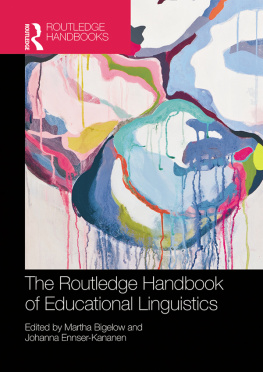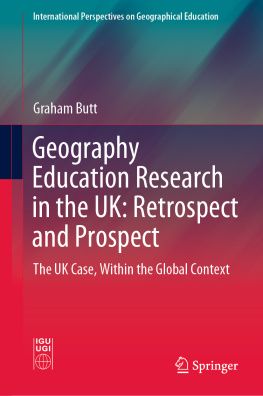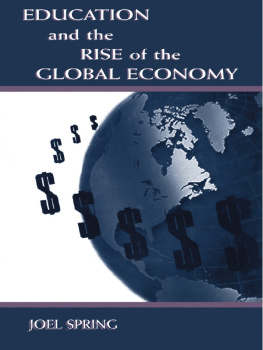I would like to thank each of the contributors for the research and insights they provided, and for their willingness to engage in a project that represented diverse perspectives on the utility of PISA. I would also like to acknowledge the late Professor Jaap Dronkers who was supportive of this project and whose intellect and academic rigor will be missed.
First published 2018
by Routledge
711 Third Avenue, New York, NY 10017
and by Routledge
2 Park Square, Milton Park, Abingdon, Oxon, OX14 4RN
Routledge is an imprint of the Taylor & Francis Group, an informa business
2018 Taylor & Francis
The right of Louis Volante to be identified as author of this work has been asserted by him in accordance with sections 77 and 78 of the Copyright, Designs and Patents Act 1988.
All rights reserved. No part of this book may be reprinted or reproduced or utilised in any form or by any electronic, mechanical, or other means, now known or hereafter invented, including photocopying and recording, or in any information storage or retrieval system, without permission in writing from the publishers.
Trademark notice: Product or corporate names may be trademarks or registered trademarks, and are used only for identification and explanation without intent to infringe.
Library of Congress Cataloguing-in-Publication Data
A catalog record for this book has been requested
ISBN: 978-1-138-21741-6 (hbk)
ISBN: 978-1-315-44052-1 (ebk)
Typeset in Sabon
by Apex CoVantage, LLC

Does education learn? was an overarching question raised at the World Bank seminars with education ministers and some of their top civil servants from several developing countries in 2000 and 2001 (when I served as vice-President for the human development network). It had been my own experience that educational policymaking took place mostly within the confines of the national experiences with education, both in terms of the organization of the systems, the (re)training of teachers, the ways and means to ensure equality of opportunity, and even to a large extent the pedagogical approach to cognitive learning and learning for citizenship, to mention a few. The Dutch Parliament felt ill at ease with drawing on examples from abroad when discussing new legislation, for example, to further equality of opportunity. In many respects I felt that compared to other sectors of society, the learning sector (education) was perhaps the least well equipped to learn from the experiences of other countries. Then I stumbled in the Education Ministers Committee in 1996 across the test phase of PISA, which was prepared by the Organization for Economic Cooperation and Development (OECD) Staff together with the Educational Testing Service (ETS). The then Secretary-General of the OECD, Jean Claude Paye happened to be the son of an Education Minister in France and confided in me that he wanted to see OECD regain the prominent place in education policy of the 1960s. In the 1960s it was OECD that provided the platform for the important role of education in economic development. The economics of education was born in Paris at OECD with supports from all over the world. OECD Secretary-General Paye, together with Thom Alexander, OECD Director for Education, were eager to bring back human capital as the most important type of capital in the OECDs advisory work to OECD Governments.
PISA was hotly debated in 1996 in the Education Ministers Committee. You could feel the tension between on the one hand the conviction that PISA might be helpful to understand the national quality of education and on the other hand, the repercussions for the popularity of the ruling Cabinet in case the results might not agree with the national sentiments. Several OECD member states decided not to participate in the test-run. One Government decided to retract from the test-stage when the first results had come in. The funding for the first full run of PISA in 2000 became a major stumbling block in the Committee. It was then a small miracle that in 2000 the first PISA results were published for 28 countries. Since the initial administration, countries have utilized, some to a greater and others to a lesser extent, the results of the different PISA cycles over the years. PISA provided the opportunity for countries to learn from one another. In the process they noticed the tremendous wealth of the PISA data, but also its limitations. This is why I believe that this book is so important for scholars and politicians to read and digest. This book is as any book on educational policy should be: multidisciplinary, looking at education from a variety of different disciplinary directions and perspectives. It must have been a tremendous effort on the part of the editor to bring these different points of view together, some of which hold opposing opinions on the overall utility of PISA for national policy development. Professor Volante and the authors of the different chapters are to be congratulated in bringing these important insights to the global stage, so that education systems can learn better from each other, against the flow of short-term interests of many politicians, against the inherent conservatism in the education sector, and in favor of equality of opportunity and high quality competencies for the labor market and society. This edited volume also makes it abundantly clear that national policymakers need to consider PISA results in relation to the broader cultural, social, and economic context in which they are situated.
Jo Ritzen, Professor of International Economics of
Science, Technology & Higher Education,
UNU-MERIT/Graduate School of Governance,
Maastricht University
Former President, Maastricht University (200311)
Former Minister of Education, Culture and Sciences,
the Netherlands (198998)
Sjaak Braster is an Associate Professor for Sociology and Methodology at Erasmus University Rotterdam, the Netherlands, and was Emeritus Professor of History of Education at Utrecht University, the Netherlands from 2003 to 2010. In 1996 he published his Ph.D. thesis on the identity of public education. Recent publications include The Black Box of Schooling. A Cultural History of the Classroom (Bruxelles: Peter Lang, 2011) (with Ian Grosvenor & Maria del Mar del Pozo), A History of Popular Educating: Educating the People of the World (London/New York: Routledge, 2013) (with Frank Simon and Ian Grosvenor), and in 2014: From Holland to Hamburg: The experimental and community schools of Hamburg seen through the eyes of Dutch observers (19191933), Paedagogica Historica, 50 (5), 615630.
Daniele Checchi is Professor of Economics at the University of Milan (Italy), Senior Research Fellow at IRVAPP and Research Fellow at the Institute for the Study of Labour IZA (Bonn) since 2003. He studied Economics at Bocconi University and the LSE where he received his Masters degree. His current research interests cover a variety of fields in labor economics, including the economics of education, intergenerational mobility, labor market institutions, and union density. On these topics he has published in several journals, including Economic Policy, Journal of Public Economics , and the Journal of the European Economic Association . Daniele was Principal investigator of funded projects, among others, by the Italian Ministry of Public Education and the INVALSI-Italian Institute for the Assessment of the Educational System. He was consultant for the European Commission and coordinator of the Milan unit under the GINI project Growing Inequalities Impacts, financed by European Union under 7th Framework Programme.

